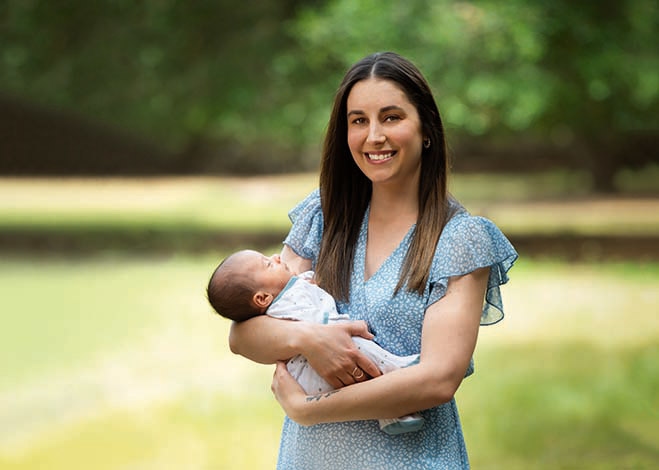
Preparing for Childbirth, Breastfeeding & Having a Family
It took four years and several rounds of fertility treatments for Mia Rogan-Delgado and her husband to hear two words: “You’re pregnant.”
“It felt surreal,” Rogan-Delgado says. “We were excited, of course, but we had waited so long to get this news that we kept thinking, is this real?”
The Lodi native knew that she wanted to deliver her baby at Adventist Health Lodi Memorial. “I was born at Lodi Memorial myself, so it was cool that I was able to deliver my baby there as well,” she says. “Anytime a family member has gone to the hospital, they’ve had great care, and a lot of my cousins have had babies there.”
Care for new families
Adventist Health Lodi Memorial’s maternal child team is well equipped to support new parents and babies through labor, delivery, recovery and beyond, says Valerie Stump, director of maternal child services. “We deliver between 75 and 80 babies each month, and we’ve won numerous prestigious awards for our care and safety,” she says.
The maternal child services has private labor and delivery rooms, 12 postpartum rooms and a four-bed neonatal intensive care unit for babies born after 32 weeks’ gestation who need additional care. “We have the best nurses around,” Stump says. “They really care about each person and want to facilitate the best experience.”
Further Reading: How Can Your Family Physician Help?
A smooth delivery
Doctors at the hospital induced labor for Rogan-Delgado at 39 weeks, and before long she had delivered baby John. “I had heard stories that labor could be a long process, but for me it was only 10 hours from when I was induced to when he was born,” she recalls. Stump says many of the labor and delivery nurses are specially trained in techniques to help facilitate vaginal birth, which can reduce labor length and pain. They also have special training for cesarean births, so parents have the same nurse throughout delivery.
When Rogan-Delgado finally saw her baby boy for the first time, she was overcome with emotion. “It’s hard to describe in words how I felt in that moment,” she says. “We had been waiting so long to meet this little guy, and he was finally here.”
Further Reading: Made for More Tender Moments: How the NICU saves baby’s lives.
Support for nursing mothers
Rogan-Delgado knew she wanted to breastfeed John, so she quickly connected with one of the two lactation consultants on staff at the hospital. “The consultants were really great,” she says. “They came around to help me get everything going.” After she was discharged, she and baby John returned to the hospital for a biweekly breastfeeding support group for new mothers. “He had a little trouble latching at first,” she adds, “and they helped me figure that out.”
Now, the whole family is home, and the new parents are loving the adventure of raising John. “We’re getting into a good routine, figuring out a schedule with his feedings and naps, and just getting to know each other,” Rogan-Delgado says. “He’s such a good baby.”
Further Reading: Breastfeeding: A Gift of Health for Baby and Mom
Welcoming new babies safely
Adventist Health Lodi Memorial prides itself on helping parents welcome their newborns into the world with expertise and compassion. “My expectation is that you get safe and excellent care when you come here,” says Valerie Stump, director of maternal child services. In fact, a partnership with the University of California, Davis ensures that even the tiniest babies receive expert care tailored to their needs. “Babies that are born before 32 weeks’ gestation go to UC Davis for specialized care, and when they’re stable, they can return to our hospital until they’re ready to go home,” Stump says. Here are more ways Adventist Health Lodi Memorial helps new parents raise newborns safely:
- Breastfeeding support: Providers empower mothers with the confidence, skills and information to successfully breastfeed from birth.
- Safe sleep: The hospital equips new families with a Halo sleep sack and information on safe sleep practices for babies.
- Skin-to-skin bonding: Every new parent gets a Joeyband positioning band for skin-to-skin contact to encourage bonding and optimize breastfeeding.



